Check the Date: How Consumer Choices Enable Gaza's Famine
A guide to ethical consumption while Gaza faces engineered starvation
Lately, I'm not speechless - if anything, I'm biting my tongue and clenching my fists - because our focus keeps drifting from the only truth that matters: Israel is starving Palestine.
There's a bitter irony in writing about boycotting dates during a forced famine. But this isn't just about consumer choices - it's about understanding how economic systems of occupation directly enable the humanitarian catastrophe we've been witnessing not just since October 23, but well before.
I made a guide 1.5 years ago on this - sharing below:
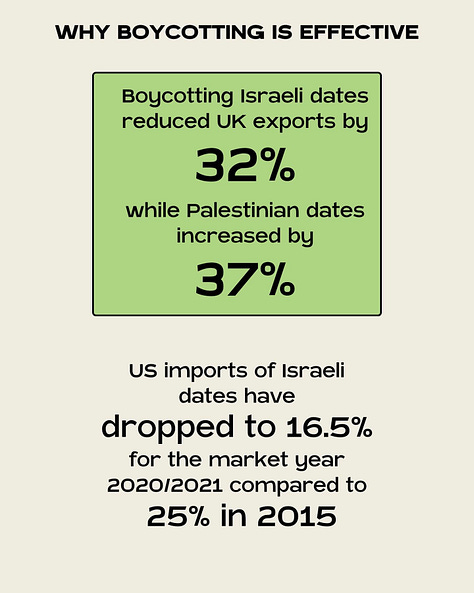
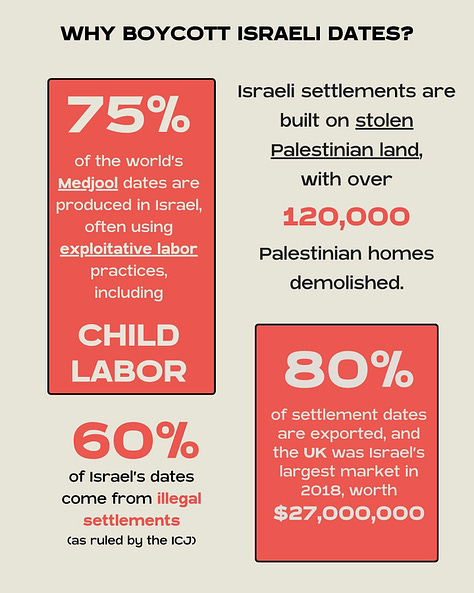
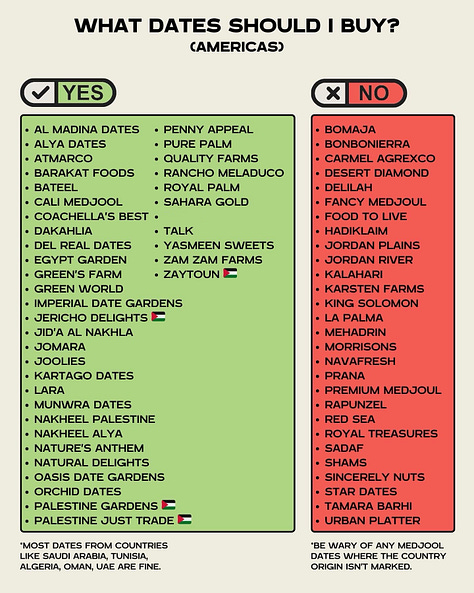
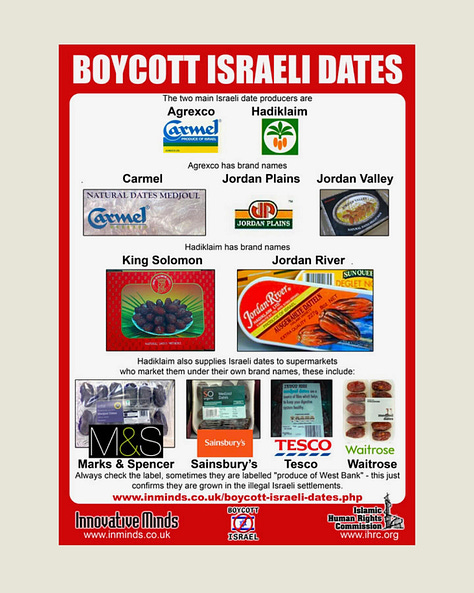
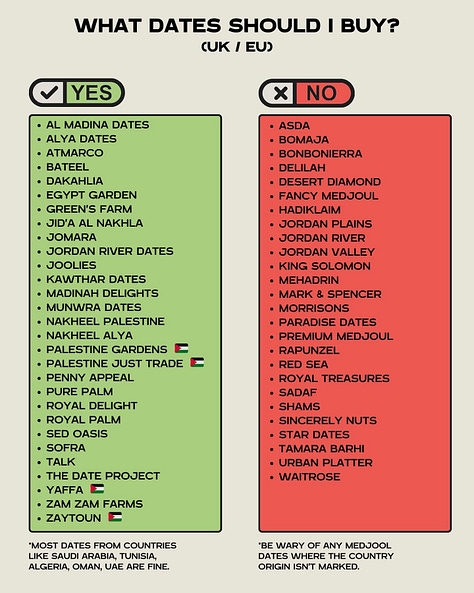
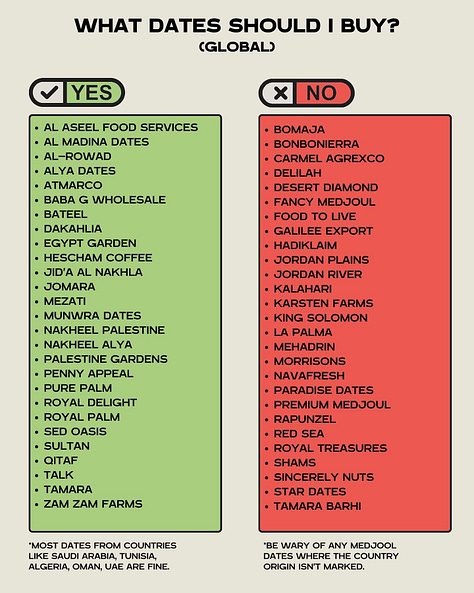
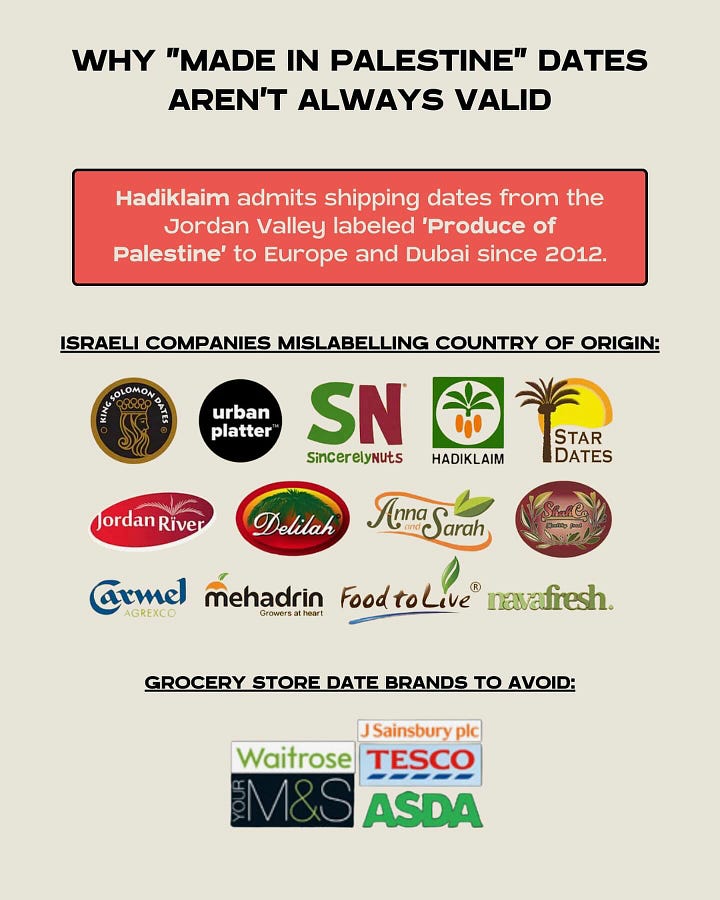
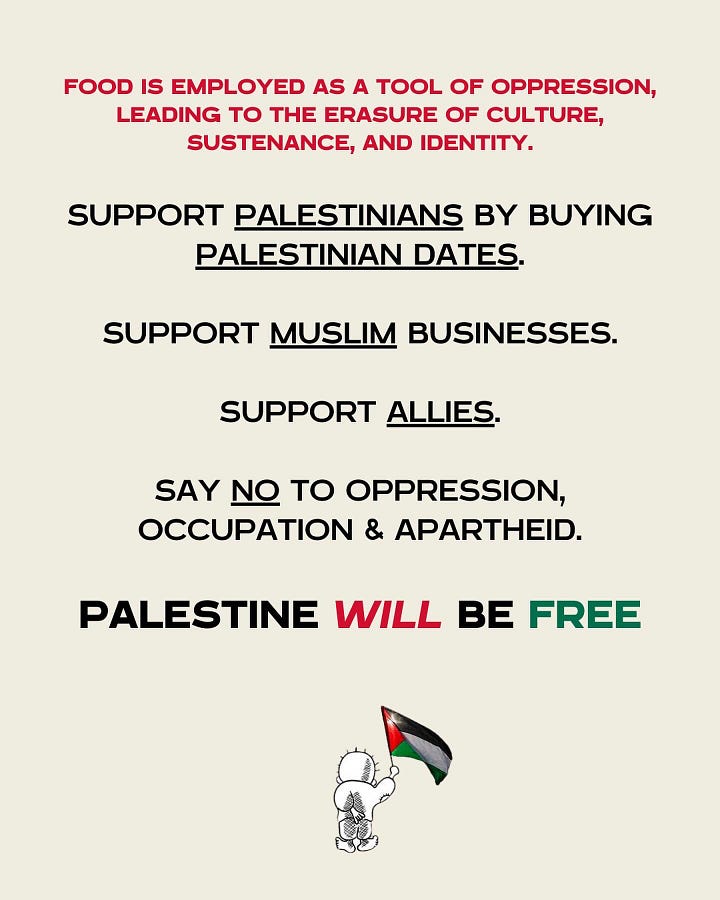
The Economic Engine of Occupation
Every Israeli date purchased with settlement origins helps fund the very system that makes Gaza's blockade possible. Every Palestinian date purchased helps build economic alternatives that could, over time, reduce Palestinian dependence on Israeli-controlled systems.
I’m focusing on dates, but what I hope you get from this post is about recognizing that our daily consumption choices either reinforce or challenge systems of oppression. While families in Gaza face engineered starvation, we have the power to withdraw economic support from the apparatus causing their suffering.
Why Dates Matter More Than You Think
Israel is a major date exporter: Medjool dates worth over $330 million were exported in 2022, and about 75% of the world’s Medjool dates are produced by Israeli farms - many in occupied territories.
Israel ranked as the world’s 3rd largest date exporter, earning $273M in 2023—with about 75% of Medjool dates globally produced in Israel and 60% grown in illegal settlements.
Illegality under international law: The International Court of Justice’s 2024 advisory opinion ruled that products from settlements in the occupied territories should be avoided, as part of obligations to not support the illegal occupation.
NGOs report many of these farms operate on confiscated Palestinian land, with exploitative labor conditions, including child labor.
The UK remains Israel’s #2 export destination, importing approximately £24M worth of dates in 2023—accounting for 1 in 3 dates sold in UK stores.
Mis‑labelling is evolving: Israeli companies — notably Mehadrin and Hadiklaim — have been caught labeling settlement‑dates as “Produce of Palestine”, even while retaining control of production and distribution.
Observable Impact of the Boycott
Exports dropped sharply in key markets: US imports of Israeli dates fell from ~10.7 million kg in 2015–16 to just ~3.1 million kg by 2017–18, as a result of consumer campaigns.
Ethical consumption shifts markets: UK companies like Waitrose, Tesco and Marks & Spencer have removed brands like King Solomon, Jordan River, Bomaja, Mehadrin, and Carmel following pressure.
Legal changes underway: Ireland is drafting legislation to ban all imports of goods (dates, olives, oranges) from settlements, prompting EU-level trade reviews.
❌ Brands to Avoid
Common Israeli settlers’ date brands to boycott:
Hadiklaim (sold under King Solomon, Jordan River, Tamara, Desert Diamond, Rapunzel, Carmel Agrexco, Mehadrin, Delilah etc.)
Mehadrin
Carmel Agrexco
Galilee Export
Star Dates
Urban Platter
NavaFresh
Sincerely Nuts
Anna & Sarah
✅ Ethical Brands to Support (US / UK / EU)
Look for Palestinian‑produced dates, often under these labels (Please share more in comments if I missed any and I’ll keep updating this list!):
These prioritize fair trade, work with Palestinian farmers, and avoid profits flowing to occupation structures.
How to Take Action Now
Immediate steps:
Check labels carefully - Avoid "Product of Israel" or "Made in Israel/West Bank"
Verify barcodes - Israeli products often begin with 729, though newer codes (871, 841) may also indicate Israeli origin
Support trade justice movement - Back civic campaigns (e.g. those in Ireland or EU) demanding bans on settlement goods
Share information - Use hashtags #CheckTheDate and #CheckTheLate
Institutional pressure - Contact retailers, food brands, cafes etc. demanding clearer labeling and removal of settlement products. Here's a template:
Subject: Urgent Request: Remove Israeli Products Complicit in Human Rights Violations
Dear [Retailer Name],
I am writing to express serious concern regarding the sourcing and sale of Israeli products in your stores that are directly linked to illegal settlements and ongoing human rights violations against Palestinians.
As your customer committed to ethical consumption, I urge you to:
Review your supply chain to identify settlement-sourced products
Provide clear, accurate labeling of all products from Israel/occupied territories
Discontinue sourcing from suppliers involved in settlement production
Consumers worldwide are increasingly concerned about ethical sourcing. I urge you to adopt responsible policies aligned with international human rights standards.
Thank you for your immediate attention to this matter.
Respectfully,
[Your Name]
The Bigger Picture: Addressing Gaza's Famine
While boycotts address long-term structural issues, Gaza's immediate crisis demands urgent action:
Direct relief: Donate to vetted organizations providing food aid. Current aid levels (100 trucks daily) remain far below pre-conflict levels (500+ trucks daily).
Advocacy: Pressure governments to demand increased humanitarian access, recognize Palestinian statehood, and support meaningful ceasefire initiatives.
Community mobilization: Organize local fundraising for emergency supplies—solar lights, water purification tablets, medical supplies.
And some previous posts to encourage you to mobilize:
Ayesha Recommends: Be Good Trouble.
What are you going to tell the next generation when they read about the ongoing Palestinian genocide and ask you, “Did you do anything about it?”
Ayesha Recommends: Now What?
I woke up today with that familiar heaviness—the same one I felt in 2016, except number now. It's a feeling that never really left, just shape-shifted and intensified over the past year. You know the one. The election results didn’t really shock me, albeit it’s not something I wanted to see, but regardless, Palestinian bodies will continue to be brutall…
With resilience,
Ayesha x



